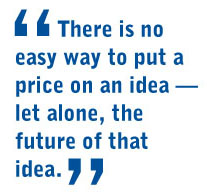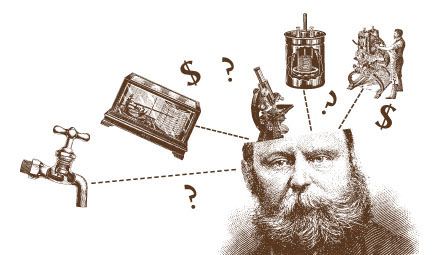


The Price of an Idea
— Catherine Gianaro


There is no easy way to put a price on an idea — let alone, the future of that idea.
But that’s precisely the challenge that confronted UGA law professor Paul Heald when he and former student Rusty Denton set out to develop a system for setting prices on patents.
“If you’re selling a stock, it’s really easy. You look in The Wall Street Journal, and you see what the price of the stock is. If you’re selling a car, you look in the Blue Book to see what it’s worth,” Heald said. “But it’s amazing how difficult it is to trade and license patents because it’s virtually impossible to figure out what they’re worth.”
For example, what’s the value of a patent on the SARS virus and its genes? If the World Health Organization successfully contains the disease, the patent may be worthless. But if outbreaks spread, vaccines and treatments developed from patented material could be worth millions.
Granted by the government, patents give inventors the right to keep others from using a unique new idea without paying for it — essentially a mini-monopoly for a period of time.
“If you can exclude a lot of people from doing a lot of things, then your patent is likely to be more valuable,” Heald said.

Patents may be sold to manufacturers or developers, but there is no standard formula or “metric” to determine their worth.
So Heald and Denton sought to develop the first precise patent pricing metric. Denton, now a contract attorney with Atlanta’s King & Spalding firm, holds both an MBA and law degree from the university as well as a doctorate in chemistry from the University of Massachusetts, Amherst.
The pair looked first to the investment banking industry, which, Heald said, has the most advanced pricing models. “They’re the ones who finance sales of whole companies,” he said, “so they think about valuing assets in a very sophisticated way.”
The lawyers then turned to the breakthrough Black-Scholes equation — a formula for pricing stock options that won its inventors the 1997 Nobel Prize in economics.
“The key to understanding the logic of our model is recognizing how much patents resemble stock options,” the authors wrote in a recently submitted law review article.
Denton adapted the complex Black-Scholes model to price patent licenses. The Denton variation, which contains a full page of mind-boggling mathematics, takes into account market share, industry averages and the math of pricing options.
“For pricing stock options, who the parties are is totally irrevelvant,” Heald said. “This is not true when you’re talking about licensing patents. Who the buyers and sellers are really matters. It affects the price for many reasons. For one company, the patent may be useless. Another company may be willing to pay a lot. But for one share of IBM, the price is the same for everyone.”
“This adds a layer of complexity and difficulty that doesn’t exist when pricing stock options,” Heald added.
For this reason, the researchers infused their model with “game theory,” which uses formulas and algorithms to predict outcomes in situations where people compete or cooperate. The application of game theory to economics was made famous by the Nobel Prize-winning work of John Nash, whose life and work is featured in the film A Beautiful Mind.
“Our model accounts for these bargaining realities that arise in patent licensing that don’t arise when you’re selling stock,” Denton said. “It accounts for differences in bargaining power and for the contextual differences that arise when two parties seek to price a patent, and the price gets adjusted accordingly.”
Ultimately, their formula likely will be used more by lawyers than finance professionals because “patent attorneys figure out what this legal document, the patent, really gets you,” Heald said. “It’s the patent attorneys who will drive any new emerging market that might arise from this equation.”
For more information, contact Paul Heald at heald@uga.edu
For comments or for information please e-mail the editor: jbp@ovpr.uga.edu
To contact the webmaster please email: ovprweb@uga.edu
![]()